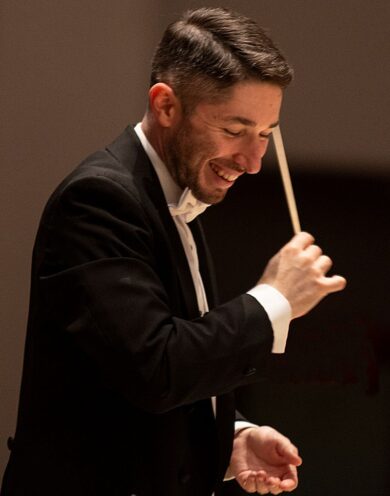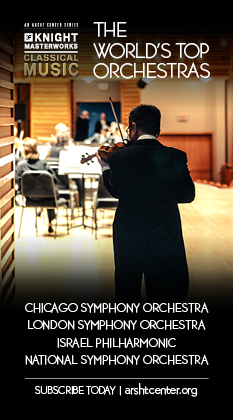Master Chorale eloquently illuminates a rarely heard Mozart masterpiece

Brett Karlin led the Master Chorale of South Florida in Mozart’s Mass in C minor Friday night in Fort Lauderdale.
Brett Karlin’s leadership of the Master Chorale of South Florida over the past eight years has brought many fine performances of major choral works, culminating in a stirring realization of the “Ode to Joy” in Beethoven’s Ninth Symphony with the New World Symphony in January.
Karlin and the group reached another milestone on Friday night with an eloquent, deeply felt performance of Mozart’s Mass in C minor at Coral Ridge Presbyterian Church in Fort Lauderdale.
The mass is Mozart’s largest sacred work, requiring a bigger instrumental component than the Requiem or other shorter liturgical compositions. While it is incomplete, lacking a “Libera me” and full “Credo” and “Benedictus,” the score is hardly a torso at over fifty minutes. The mass pays homage to Mozart’s admiration for the music of Bach and Handel while also suggesting the melodic felicity of the arias in his operatic works.
Any performance of this grand musical canvass requires strong choral singing, four excellent soloists, a well- coordinated instrumental ensemble and a conductor who can fuse stylistic affinity with a total grasp of the score’s monumental architecture.
Karlin and his forces were fully up to meeting the challenge. The astutely balanced female voices soared through the large, resonant sanctuary in the opening plea for mercy of the “Kyrie.” Karlin drew a wide dynamic range from his 120- voice group. Full voiced, weighted climaxes were matched by soft, quiet singing of great fervor and power. The singers’ vociferous projection at the onset of the “Gloria” was given vigor and thrust by Karlin.
The Arcadian Ensemble, a group of top-notch local freelance players, brought accuracy, precision and strong accompanying support. The crucial brass parts were executed with solidity and impact, and Karlin was in total command of both vocal and instrumental participants.
Karlin’s transformation of the Master Chorale into a well-blended unit was particularly on display in the clarity of the contrapuntal writing in the “Cum Sancto Spiritu” and the “Sanctus.” In the “Benedictus,” a final celebratory and festive “Hosanna” concluded the performance in vibrant fashion. Throughout the score’s shifting moods and patterns, Karlin inspired the best from his singers and players.
The star of the consistently fine solo quartet was Robin Johannsen. This American soprano has sung at major European opera houses and recorded with top period performance specialists. In the aria “Et incarnatus est,” one of Mozart’s most sublime melodies, Johannsen’s dexterity and agility was fully in evidence but she offered welcome restraint and attention to the text’s spiritual cast. The duet “Domine Deus” with mezzo-soprano Clara Osowski radiated charm, buttressed by the stellar musicianship and contrasting timbres of the vocalists.
Familiar from her many performances with Seraphic Fire, Osowski had her own moment in the spotlight, bringing her burnished, amber mezzo to “Laudamus te” and delivering the solo’s high roulades with ease.
Steven Soph’s virile lyric tenor melded winningly with Johannsen and Osowski in the trio “Quoniam tu solus.” Mitchell Hutchings, a music faculty member at Florida Atlantic University, joined Johannsen, Osowski and Soph for the penultimate “Benedictus qui venit”, his mid-size baritone filling out the quartet adroitly.
The performance of the mass was preceded by Mozart’s Exultate, Jubilate. Written in the composer’s teens, it may be his first true masterpiece. Following a crisp orchestral introduction, Johannsen’s attractive light soprano, evenness between registers and fearless coloratura took center stage. Her agility in the famous “Allelujah” was nothing short of stunning. Her ability to spin phrases in long arcs, bereft of strain proved most impressive.
Karlin opened the program with Haydn’s Insanae et vanae curas. The brief motet finds the father of the symphony and string quartet in sturm und drang mode, the first part stormy and unsettled, followed by a section more serene and classically centered. Karlin’s nuanced reading was a fine warm up for singers and audience alike to the Mozart mass.
There is one remaining opportunity to hear a rare performance of one of Mozart’s most moving and significant works.
The Master Chorale of South Florida repeats the program 4 p.m. Sunday at St. Gregory’s Episcopal Church in Boca Raton. masterchoraleofsouthflorida.org.
Posted in Performances
Leave a Comment
Sat Apr 6, 2024
at 4:00 pm
No Comments



